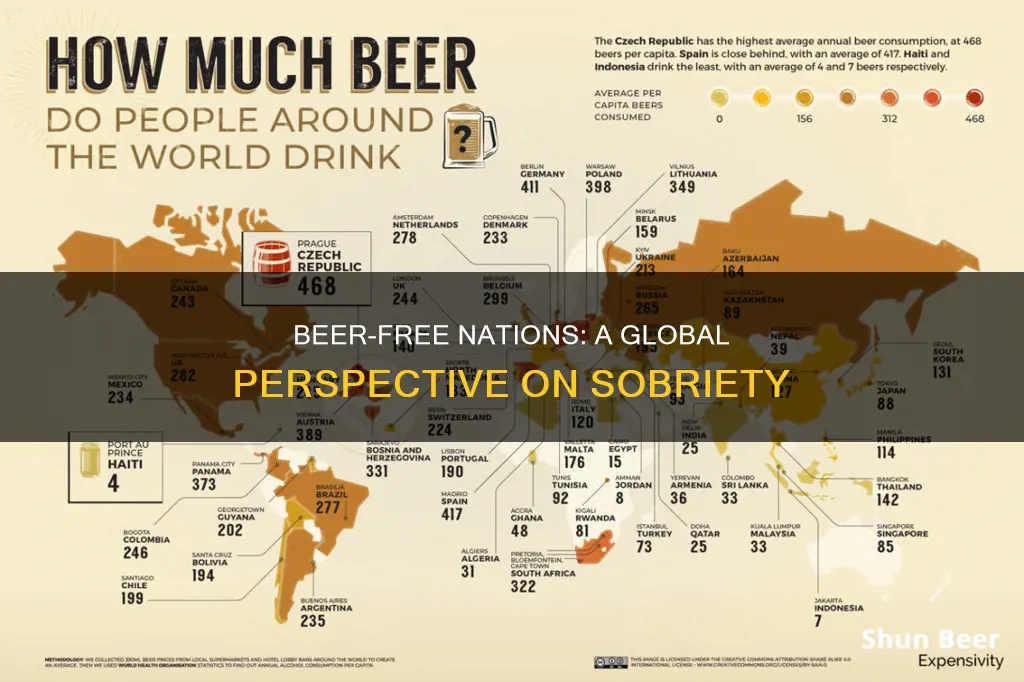
Beer is the world's most popular alcoholic drink, with the United States leading the way in terms of total consumption. However, when it comes to per capita consumption, the US doesn't even make the top 15. So, which countries are the least enthusiastic about beer?
Several countries, including Afghanistan, Kuwait, Libya, Mauritania, Pakistan, Saudi Arabia, Somalia, and Sudan, do not report any beer consumption. The lowest reported per capita beer consumption is in Tuvalu, Tonga, Bangladesh, and Syria, which each consume 0.01 litres per year.
In some countries, such as Libya, Kuwait, and Saudi Arabia, alcohol is completely banned, and harsh punishments are meted out to those who break the law. Other countries, like the United Arab Emirates, require a license to purchase alcohol, which can be difficult for tourists to obtain.
So, while beer may be a popular drink in many parts of the world, there are certainly countries where it is much less prevalent, whether due to legal restrictions or cultural preferences.
| Characteristics | Values |
|---|---|
| Alcohol banned for all citizens | Afghanistan, Kuwait, Libya, Pakistan, Saudi Arabia, Somalia, Sudan, Yemen |
| Alcohol banned for Muslim citizens | Iran, Maldives, Mauritania |
| Alcohol banned in certain states/provinces | India, Indonesia, Malaysia |
| Alcohol banned in certain communities | Australia, Canada |
What You'll Learn

Muslim-majority countries
Drinking alcohol is considered haram, or forbidden, in Islam. The Quran forbids alcohol because it is believed to harm one’s health, can lead to addiction, and disrupts society. Islamic scholars and Muslim religious authorities point to a verse in the Quran that calls intoxicants “the work of Satan” and instructs believers to avoid them.
Many Muslim-majority countries have adopted a range of civil alcohol policies, from complete prohibition to partial restrictions. Here is a list of some Muslim-majority countries and their alcohol policies:
Saudi Arabia
Saudi Arabia has a complete ban on alcohol. It is illegal to manufacture, import, sell, or consume alcohol in the country. The kingdom has strict baggage checks at airports to ensure no one enters the country with alcohol. Punishments for those caught selling or drinking alcohol in public include long-term imprisonment and flogging.
United Arab Emirates (UAE)
The sale and consumption of alcohol are allowed in most parts of the UAE, except in the Emirate of Sharjah, where it is completely banned. In Sharjah, only those with an alcohol license (usually non-Muslims) are permitted to possess and consume alcohol within their homes.
Kuwait
Kuwait has a zero-tolerance policy for drinking and driving. Even small amounts of alcohol detected in a driver's system can result in severe punishment. Alcohol use in public places is strictly prohibited and can lead to imprisonment or deportation for foreigners.
Qatar
Qatar, which follows an ultraconservative form of Islam, has strict limits on the purchase and consumption of alcohol. During the 2022 FIFA World Cup, the sale of beer at stadiums was banned, highlighting the country's efforts to balance between welcoming visitors and upholding cultural traditions.
Iran
In Iran, alcohol consumption is prohibited for Muslim citizens. However, non-Muslims are allowed to manufacture and consume alcohol under certain conditions. Non-Muslims entering the country are permitted to carry alcohol with them.
Pakistan
In Pakistan, Muslims are not allowed to brew, sell, or consume alcohol. However, non-Muslim minorities can apply for alcohol permits, which are often granted based on economic status.
Yemen
Yemen has a strict ban on alcohol, as it is considered against the principles of Islam. However, foreigners who are non-Muslims can carry a limited volume of alcohol and consume it in their private space. Alcohol is also sold in certain permitted restaurants, hotels, and nightclubs in the cities of Aden and Sana'a.
Brunei
In Brunei, alcohol consumption and public sale are banned. Non-Muslim adults can import a limited amount of alcohol when entering the country, but they must declare it to customs and consume it privately.
Bangladesh
In Bangladesh, alcohol consumption and sale are prohibited for Muslims. However, non-Muslims are not subject to these restrictions as long as they consume alcohol in their private spaces. Some restaurants, nightclubs, hotels, and bars, especially in tourist destinations, are allowed to sell alcohol.
Egypt
While Egypt has a Muslim majority, alcohol is available and served in bars and restaurants throughout the capital, Cairo. Drinking is rejected by most; in a Pew Research Center survey, 79% of surveyed Muslims in Egypt viewed alcohol as morally wrong.
Malaysia
Although Malaysia is a Muslim-majority country, alcohol is not banned nationwide. However, some states ban drinking in public, and there may be intricate rules and restrictions on its sale and consumption.
Indonesia
Indonesia has the world's largest Muslim population, and alcohol consumption is very low. Beer is the most popular alcoholic drink, and the country's beer industry is valued at around $600 million.
Sudan
In Sudan, alcohol manufacture, sale, and consumption have been prohibited since 1983 for Muslim citizens. However, non-Muslims may consume alcohol within their private quarters.
Somalia
Somalia, an Islamic country in the Horn of Africa, strictly enforces its alcohol-related laws. Alcohol manufacture, trade, and consumption are completely banned. Non-Muslims and visiting foreigners may consume alcohol within their private space.
Mauritania
In the Islamic Republic of Mauritania, Muslim residents are barred from alcohol possession, consumption, sale, and production. Non-Muslims are allowed to consume alcohol in their homes or in establishments with valid permits to sell alcohol.
Beer Breakdown: Understanding Its Effect on the Human Body
You may want to see also

Countries with partial bans
While some countries have a complete ban on alcohol, others have partial bans, with varying restrictions on the manufacture, storage, transportation, sale, possession, and consumption of alcoholic beverages. Here is a list of countries with partial bans on alcohol:
Algeria
Drinking alcohol in public places is illegal, but it is permitted in restaurants, bars, hotels, and homes.
Bangladesh
Alcohol consumption and sale are prohibited in Bangladesh. However, the law does not apply to non-Muslims residing in or visiting the country, as long as they consume alcohol in their private spaces. Additionally, some restaurants, nightclubs, hotels, and bars, especially in tourist destinations, are allowed to sell alcohol.
Brunei
Non-Muslim adults over the age of 17 can import a limited amount of alcohol, but they must declare it to customs and consume it privately.
Canada
Alcohol prohibition varies across different communities and territories in Canada. For example, in Yukon, Northwest Territories, and Nunavut, some communities have banned alcohol. Additionally, in Quebec, the sale of alcohol is prohibited in certain communities.
Chile
The sale of alcohol is banned countrywide on election days. Additionally, alcohol consumption is prohibited in public places, except for bars and restaurants.
Comoros
Alcohol is forbidden for Muslims during Ramadan.
Egypt
Drinking alcohol in public places and during Ramadan is illegal.
Indonesia
The consumption of alcohol is generally allowed, but public consumption is illegal. Non-Muslims and foreign tourists are permitted to drink alcohol in private. This restriction specifically applies to the Aceh province.
Iran
Home production of alcohol is legal for Zoroastrians, Jews, and Christians, but commercial production is prohibited. Muslims are not allowed to purchase or consume alcohol, but non-Muslims can buy it under certain conditions. Foreign visitors may bring alcohol into the country.
Iraq
Although there is a parliamentary ban on alcohol in Iraq, it is rarely enforced.
Ireland
The sale of alcohol in stores is prohibited between 10 pm and 10:30 am (12:30 pm on Sundays). Pubs are allowed to sell alcohol only during specific hours.
Israel
Selling alcohol in stores between 11 pm and 6 am is illegal, but serving it at bars, restaurants, and clubs is always permitted.
Kuwait
While Kuwait has a ban on the sale, consumption, and possession of alcohol, non-Muslims are excluded from this restriction.
Malaysia
Alcohol consumption is generally allowed, but some states prohibit drinking in public. Non-Muslims are not subject to the ban.
Maldives
Alcohol is permitted for foreigners at licensed establishments, but the transport of alcohol is illegal.
Morocco
Alcohol must be purchased and consumed in licensed hotels, bars, and tourist areas. It is also sold in most major supermarkets.
Norway
Alcohol can only be sold in stores within specific time frames on weekdays. Drinking in public places is illegal, except at bars and restaurants. Nightclubs and bars are not permitted to serve alcohol after 3 am. Alcohol stronger than 4.7% can only be purchased in designated stores, while beer or cider below 4.7% can be bought in grocery stores.
Oman
Alcohol is legal for non-Muslim foreigners at restaurants, hotels, and bars. They can also consume it at home with a license. However, drinking in public is illegal.
Pakistan
Alcohol is legal for non-Muslims and foreigners and is served in hotels. It can also be purchased at wine stores. However, it is illegal for Muslims, and public consumption is prohibited. Non-Muslims can obtain a liquor license to consume alcohol.
Palestine
The consumption and sale of alcohol are de facto illegal in the Hamas-controlled Gaza Strip, but it is legal in the West Bank.
Philippines
Alcohol sales are banned on election day and the day before. Foreigners are allowed to purchase alcohol on these days at establishments with permits.
Qatar
Alcohol is permitted for tourists at hotels and bars, and expatriates with permits can also consume it.
Saudi Arabia
Alcohol is banned in the country, but foreign diplomats are excluded from this restriction.
Sudan
Non-Muslims are allowed to consume alcohol in private.
Syria
Although alcohol is not banned in Syria, public consumption is illegal.
Tunisia
Alcohol sales are prohibited on Fridays and during Ramadan.
United Arab Emirates (UAE)
The sale and consumption of alcohol are prohibited in the Emirate of Sharjah and in public places. However, non-Muslims can obtain a license to possess alcohol in Sharjah, but they cannot drink it in public. In the rest of the UAE, alcohol is allowed to be sold in restaurants, hotels, and other licensed establishments.
United Kingdom
In Northern Ireland and Scotland, alcohol cannot be sold in stores after 10 pm.
United States
There are "dry counties" in the United States where the sale of alcohol is prohibited.
Beer and Type 2 Diabetes: What's the Verdict?
You may want to see also

Countries where tourists can drink
While some countries have strict laws against drinking alcohol, others allow it with certain restrictions. Here is a list of countries where tourists can legally consume alcohol:
Indonesia
While Indonesia has the world's largest Muslim population, alcohol is not banned across the country. In the province of Aceh, public consumption of alcohol is illegal, but non-Muslims and foreign tourists are allowed to drink in private. The country's beer industry is valued at around $600 million.
Jordan
In Jordan, drinking alcohol is accepted as long as it is done in moderation. Alcoholic beverages are served in some restaurants, and there are bars in the capital city of Amman. Amstel, owned by Heineken, is the most consumed beer in the country.
Oman
In Oman, alcohol is legal for non-Muslim foreigners at licensed restaurants, hotels, and bars. Tourists can also consume alcohol in their private residences with a license. However, drinking in public places is illegal.
Qatar
Qatar allows alcohol consumption for tourists and expatriates with permits. Alcohol is served in hotels and bars, but there are restrictions on public drinking.
United Arab Emirates (except Sharjah)
The United Arab Emirates has varying laws regarding alcohol consumption across its emirates. In Sharjah, alcohol is completely banned, and only non-Muslims with a government-issued license are allowed to possess it, but even they cannot drink in public. In the other emirates, alcohol is sold in licensed restaurants, hotels, and bars, and non-Muslims can consume it within these premises or in their private residences. Foreign tourists can bring a limited quantity of alcohol into the country for personal use.
India (except certain states)
In India, the regulations regarding alcohol vary from state to state. While some states like Gujarat, Nagaland, Bihar, and Mizoram have banned the sale and consumption of alcohol, other states have no such restrictions. Additionally, some states observe dry days during special festivals, and the entire country observes dry days during elections and specific national holidays.
Bangladesh
In Bangladesh, alcohol consumption and sale are prohibited for Muslims. However, non-Muslims, including tourists, are not subject to these restrictions as long as they consume alcohol in their private spaces. Alcohol is also served in some restaurants, nightclubs, hotels, and bars, especially in tourist destinations.
Section
In Malaysia, alcohol consumption is generally allowed, but there are some states that ban drinking in public. Non-Muslims are permitted to consume alcohol, and tourists can purchase and drink alcohol in licensed establishments.
When travelling to any of these countries, it is essential to be respectful of the local customs and regulations regarding alcohol consumption. Additionally, it is worth noting that laws and regulations can change, so checking for the most up-to-date information before travelling is always a good idea.
Beer Sales Strategies During Doubleheaders
You may want to see also

Countries with alcohol historically prohibited
Alcohol is considered ""haram" (not permissible) in the Islamic faith, and so alcohol consumption is forbidden in almost all Muslim nations. However, it is only actively banned in a few Muslim countries, mainly in the Middle East and North Africa.
Yemen
Alcohol is banned in Yemen as it goes against the principles of Islam. The sale and consumption of alcohol are illegal across the country, except in Aden and Sana'a, where alcohol is sold in certain restaurants, hotels, and nightclubs. Foreign non-Muslim visitors are allowed to bring a limited amount of alcohol into the country for private consumption.
United Arab Emirates (Sharjah)
The emirate of Sharjah in the United Arab Emirates has a complete ban on alcohol. Possession, consumption, and sale in public are prohibited and can result in imprisonment, flogging, or other forms of punishment. In other emirates, alcohol is allowed under strict regulations and can be sold in licensed restaurants, hotels, and bars.
Sudan
Sudan, a war-torn country in northeast Africa, has prohibited the manufacture, sale, and consumption of alcohol since 1983 through the Liquor Prohibition Bill. While the law primarily applies to Muslims, non-Muslims may consume alcohol in their private residences.
Somalia
Somalia, an Islamic country in the Horn of Africa, has a strict ban on the manufacture, trade, and consumption of alcohol. Non-Muslims and foreign visitors are permitted to consume alcohol but only within their private spaces.
Saudi Arabia
The Kingdom of Saudi Arabia, home to the Islamic pilgrimage site of Mecca, has a complete ban on alcohol. It is illegal to manufacture, import, sell, or consume alcohol in the country. Baggage checks at airports are strict to ensure no one brings alcohol into the country. Violators face harsh punishments, including long-term imprisonment and flogging.
Pakistan
In Pakistan, Muslims are prohibited from brewing, selling, or consuming alcohol. However, non-Muslim minorities can apply for alcohol permits, which are often granted based on economic status. Typically, non-Muslims are granted a monthly allowance of five bottles of liquor and 100 bottles of beer.
Mauritania
In the Islamic Republic of Mauritania in Western North Africa, Muslim residents are barred from possessing, consuming, selling, or producing alcohol. Non-Muslims, however, are allowed to consume alcohol in their homes or in licensed hotels and restaurants.
Maldives
The Maldives, a popular tourist destination in the Indian Ocean, bans alcohol for the local population. Alcohol is only available to visitors in resorts and some licensed hotels and restaurants.
Libya
Libya has strict laws prohibiting the sale and consumption of alcohol, with harsh punishments for those who violate them. However, reports suggest that alcohol is still available through illegal means.
Kuwait
Kuwait has a zero-tolerance policy for drinking and driving, and even small amounts of alcohol detected in a driver's system can result in severe penalties. Possession, consumption, and sale of alcohol are banned, and public consumption can lead to imprisonment or deportation for foreigners.
Iran
In Iran, alcohol consumption is prohibited for Muslim citizens. However, non-Muslims are allowed to manufacture and consume alcohol under certain conditions. Non-Muslims entering the country are permitted to bring alcohol with them. Home production is legal for Zoroastrians, Jews, and Christians, but commercial production is illegal.
Beer and Stress Tests: What You Need to Know
You may want to see also

Countries with alcohol currently prohibited
Alcohol is currently prohibited in several countries, with varying degrees of restrictions and enforcement. Here is a list of countries with alcohol prohibition:
Yemen
Yemen has a complete ban on alcohol, as it is considered against the principles of Islam. Yemeni citizens are prohibited from consuming, purchasing, or selling alcohol within the country. However, there are some exceptions for tourists in certain hotels and nightclubs in the cities of Aden and Sana'a.
United Arab Emirates (Sharjah)
In the Emirate of Sharjah, alcohol is strictly prohibited. Possession, consumption, and any other form of alcohol use in public are illegal and punishable by imprisonment, flogging, or other forms of punishment. Non-Muslims can obtain an alcohol license from the government to possess and consume alcohol within their homes.
Sudan
Sudan, a war-torn country in northeast Africa, has prohibited the manufacture, sale, and consumption of alcoholic beverages since 1983 through the Liquor Prohibition Bill. The law primarily applies to Muslims, while non-Muslims may consume alcohol within their private residences.
Somalia
Somalia, an Islamic country in the Horn of Africa, has a complete ban on the manufacture, trade, and consumption of alcohol. Non-Muslims and visiting foreigners are permitted to consume alcohol within their private spaces. However, strict punishment is enforced for those who violate Islamic laws.
Saudi Arabia
The Kingdom of Saudi Arabia, home to Islam's holiest site, Mecca, has a total ban on alcohol. It is illegal to manufacture, import, sell, or consume alcohol in the country. Strict baggage checks are conducted at airports to enforce this prohibition. Violators face harsh punishments, including long-term imprisonment and flogging.
Pakistan
In Pakistan, Muslims are prohibited from brewing, selling, or consuming alcohol. However, non-Muslim minorities can apply for alcohol permits, which are granted based on economic status. Typically, non-Muslims are allowed a monthly grant of five bottles of liquor and 100 bottles of beer.
Mauritania
In the Islamic Republic of Mauritania in Western North Africa, Muslim residents are barred from possessing, consuming, selling, or producing alcohol. On the other hand, non-Muslims are permitted to consume alcohol in their homes or in establishments with valid permits, such as hotels and restaurants.
Maldives
The Maldives, a popular tourist destination, has banned alcohol for the local population. Only resorts, hotels, and restaurants with special permits are allowed to sell alcohol to visitors.
Libya
Libya has strict laws regarding alcohol, with complete prohibition on its sale and consumption. Punishments are enforced for those who publicly sell or consume alcohol. However, reports suggest that alcohol is still available through illegal means.
Kuwait
Kuwait has a zero-tolerance policy for drinking and driving, with heavy penalties even for small amounts of alcohol detected in a driver's system. Possession, consumption, and sale of alcohol are banned, and public consumption can lead to imprisonment or deportation for foreigners.
Iran
In Iran, alcohol consumption is prohibited for Muslim citizens. However, non-Muslims have certain relaxations, as they are allowed to manufacture and consume alcohol under specific terms and conditions. Non-Muslims entering the country are permitted to carry alcohol with them.
India (Certain States)
In India, regulations related to alcohol vary by state. Some states, such as Gujarat, Nagaland, and Bihar, have strictly banned the sale and consumption of alcohol within their boundaries. Other states observe dry days during special festivals, elections, or national holidays.
Brunei
Brunei prohibits alcohol consumption and sale in public places. Non-Muslim adults can import a limited amount of alcohol but must declare it to customs and consume it privately.
Bangladesh
Bangladesh prohibits alcohol consumption and sale. However, non-Muslims residing in or visiting the country are exempt from these restrictions as long as they consume alcohol within their private spaces. Some establishments in tourist destinations are allowed to sell alcohol.
Beer and Acetaminophen: A Safe Mix?
You may want to see also
Frequently asked questions
Several countries have a complete ban on alcohol, including Yemen, Libya, and Somalia. In these countries, the manufacture, sale, and consumption of alcoholic beverages are prohibited.
Yes, there are sometimes exceptions for non-Muslim foreigners or non-Muslims in general. For example, in Yemen, non-Muslim foreigners are allowed to consume alcohol in certain permitted restaurants, hotels, and nightclubs in Aden and Sana'a. Similarly, in Saudi Arabia, alcohol is available to foreign diplomats.
Yes, some countries have partial restrictions or prohibitions on alcohol. For instance, in Brunei, non-Muslim adults can import a limited amount of alcohol but must consume it privately. Similarly, in Bangladesh, non-Muslims are exempt from the ban as long as they consume alcohol in their private spaces.
Yes, many countries allow alcohol consumption but have regulations and restrictions in place. For example, in Norway, alcohol can only be purchased within a specific timeframe on weekdays, and it is illegal to drink in public places except in bars and restaurants.
Several countries have had periods of alcohol prohibition in the past, including the United States (1920-1933), the United Arab Emirates (until 2020), and Finland (1919-1932), among others.







